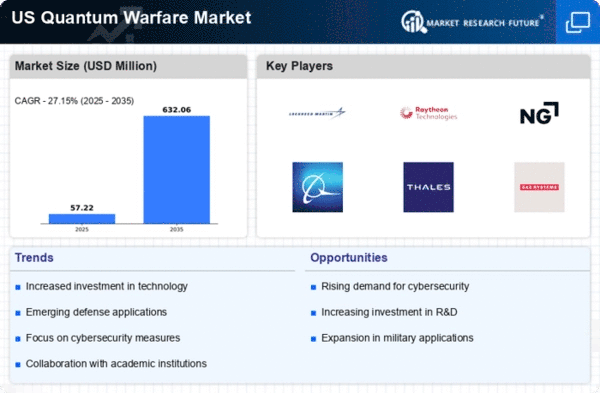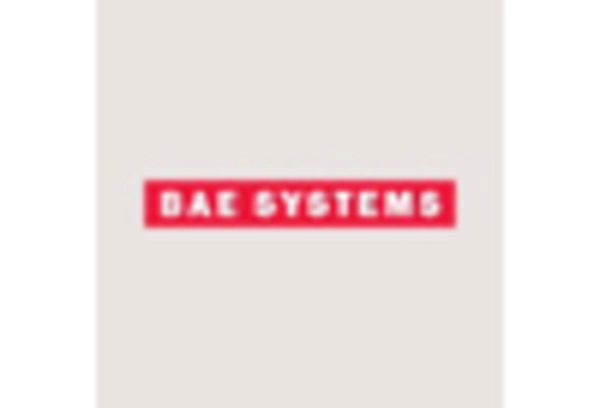International Competition
The quantum warfare market is increasingly shaped by international competition among nations striving for technological supremacy. The U.S. is in a race with other countries, particularly China, to develop and deploy quantum technologies for military applications. This competition is driving significant investments in research and development, as nations recognize the strategic advantages that quantum capabilities can provide. The U.S. government has initiated various programs to foster innovation in quantum technologies, with an emphasis on collaboration between military and academic institutions. This competitive landscape is likely to accelerate advancements in the quantum warfare market, as countries seek to secure their positions in the global arena.
Cybersecurity Enhancements
The quantum warfare market is being propelled by the urgent need for enhanced cybersecurity measures. As cyber threats become more sophisticated, traditional security protocols are proving inadequate. The U.S. military is actively exploring quantum-resistant encryption methods to safeguard sensitive information. This shift is indicative of a broader trend within the defense sector, where the integration of quantum technologies is seen as essential for maintaining data integrity and security. The market for quantum cybersecurity solutions is projected to reach $5 billion by 2027, reflecting a growing recognition of the importance of quantum technologies in protecting national security. The emphasis on cybersecurity within the quantum warfare market underscores the critical role of advanced technologies in modern defense strategies.
Emerging Defense Strategies
The quantum warfare market is experiencing a notable shift as defense strategies evolve to incorporate quantum technologies. The U.S. Department of Defense has recognized the potential of quantum computing and quantum communication to enhance national security. This shift is driven by the need for advanced capabilities to counteract emerging threats. As a result, investments in quantum research and development have surged, with the U.S. government allocating over $1 billion annually to quantum initiatives. This focus on quantum technologies is expected to reshape military operations, making them more efficient and secure. The integration of quantum solutions into defense strategies is likely to create a competitive edge, thereby propelling growth in the quantum warfare market.
Advancements in Quantum Computing
The quantum warfare market is significantly influenced by advancements in quantum computing technology. As computational power increases, the ability to process vast amounts of data in real-time becomes feasible. This capability is crucial for military applications, including cryptography, simulations, and strategic planning. The U.S. government has invested heavily in quantum computing research, with projections indicating a market growth rate of approximately 25% annually. These advancements not only enhance operational efficiency but also provide a strategic advantage in warfare scenarios. The ongoing development of quantum algorithms and hardware is expected to further drive the quantum warfare market, as military applications become increasingly reliant on sophisticated computational techniques.
Integration of Artificial Intelligence
The integration of artificial intelligence (AI) with quantum technologies is emerging as a pivotal driver in the quantum warfare market. AI algorithms can leverage quantum computing capabilities to enhance decision-making processes and operational efficiency in military applications. The U.S. Department of Defense is exploring the synergies between AI and quantum technologies to improve predictive analytics and threat assessment. This integration is expected to revolutionize military strategies, enabling faster and more accurate responses to emerging threats. As the quantum warfare market evolves, the collaboration between AI and quantum technologies is likely to create new opportunities for innovation and growth, positioning the U.S. at the forefront of modern warfare.
















